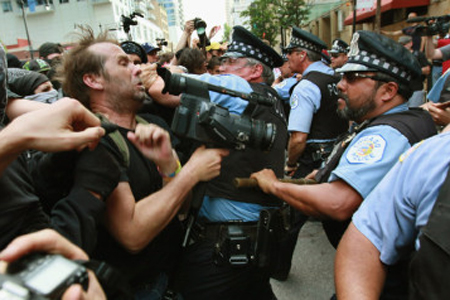
CHICAGO — Decades have passed since Chicago police commander Jon Burge was fired, but the stain of hundreds of allegations of police torture and growing evidence of a code of silence that covered up misconduct still looms large in the Windy City.
Burge’s legacy was front and center again Wednesday when Huffington Post investigative reporter Radley Balko, author of Rise of the Warrior Cop: The Militarization of American Police Forces, joined a panel of Chicago activists and organizers to discuss the American police trends toward aggressive tactics and away from accountability.
“It’s hard to think there’s anything new going on” with policing in Mayor Rahm Emanuel’s Chicago, Balko said in an interview before speaking at the Roosevelt University event. “The priorities are clearly still out of whack.” He pointed to the city’s staggering number of low-level marijuana arrests and its low murder clearance rate.
Last week, after the city approved $12.3 million in settlements with two men who say they were victims of police torture during the Burge era, which spanned from 1972 to 1991, Emanuel acknowledged the scandal has left “a stain on the city’s reputation” and apologized “this happened.” He urged: “Now let us all move on.” Burge, now 65, is serving a four-year federal prison sentence for perjury and obstructing justice.
Moving on will be a challenge for Chicagoans who lack confidence in the city’s Independent Police Review Authority, which looks into complaints of police misconduct. Chicago Reporter found that the authority has deemed valid only 1 percent of the allegations it investigated over three years.
These issues are familiar for Balko, who has explored police misconduct in Chicago for HuffPost. Chicago also figures in Warrior Cop, published in July by PublicAffairs.
The problem, Balko explained to the Roosevelt audience, is that “risk-averse” politicians in high-crime cities often feel they can’t take a stand against aggressive policing. That mostly remains the case, despite New York mayoral candidate Bill de Blasio’s stand against police “stop-and-frisk” tactics that helped him win the Democratic primary earlier this month, Balko said.
“All [politicians] know is the only position on crime is to be tough or tougher on it,” Balko said. “So it’s not enough to just give politicians political cover to do the right thing. … It has to be a political liability to not do the right thing. People have to start voting on these issues and have to start giving to campaigns based on these issues and make it known that that is why you’re taking the position that you are.”
Homicides, shootings and overall crime are down in Chicago this year from last year — when, according to FBI data released this week, the city led the nation in the number of murders. But gun violence continues to capture headlines as the city’s murder rate remains the highest among the nation’s three largest cities.
Balko suggested incentives for police officers to live in the same neighborhoods they patrol, so they can participate in school and community activities and have a stake in the community.
“You have entire communities where the people are more in fear of police than they are thinking the police are there to protect them,” Balko said. “And that’s a failure of police,” he said.
